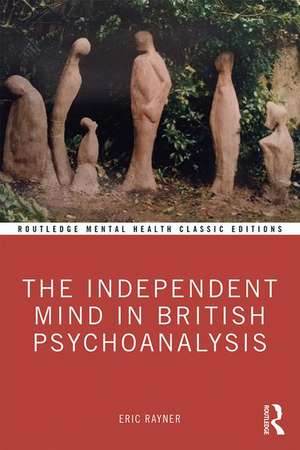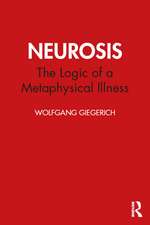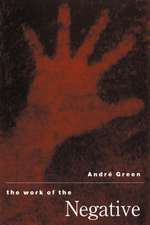The Independent Mind in British Psychoanalysis: Routledge Mental Health Classic Editions
Autor Eric Rayneren Limba Engleză Paperback – 3 iun 2020
Arguably the most informative and readable account of the development of British independent psychoanalysis, Eric Rayner's The Independent Mind in British Psychoanalysis offers a coherent account of the core concepts that influence the clinical practice. Covering the main themes and theorists with rigour and clarity, it has rightly found a central place on the reading lists of psychoanalytic and psychotherapy trainings, both in the UK and worldwide.
Republished with a new forward from Maurice Wheelan, the book begins with a philosophical and historical background, describing the establishment of the 'Middle Group' (later called the Independents) following the controversial discussions between the supporters of Melanie Klein and Anna Freud. The succeeding chapters detail the contributions by Independent psychoanalysts including Fairbairn, Balint, Rickman, Winnicott, Bowlby, and Khan, to themes such as emotions, object relations, sexuality, aggression, perversion, regression, symbolisation, creativity, art, and dreams. Rayner relays the ethos of the Independent psychoanalytic 'mind' as tolerant, creative and respectful, with an understanding of the developmental roots of pathology in early relationships and with balanced thinking about the impact of the real environment as well as the internal world on a person's character.
Providing a thorough exploration of the development of thinking within the tradition of the British Independent school of psychoanalysis, this book will be of great interest to psychoanalysts, psychotherapists, counsellors, social workers, students, and even non-clinicians interested in the history of psychoanalysis.
| Toate formatele și edițiile | Preț | Express |
|---|---|---|
| Paperback (1) | 245.24 lei 6-8 săpt. | |
| Taylor & Francis – 3 iun 2020 | 245.24 lei 6-8 săpt. | |
| Hardback (1) | 1100.70 lei 6-8 săpt. | |
| Taylor & Francis – 3 iun 2020 | 1100.70 lei 6-8 săpt. |
Din seria Routledge Mental Health Classic Editions
- 5%
 Preț: 365.69 lei
Preț: 365.69 lei - 5%
 Preț: 233.17 lei
Preț: 233.17 lei - 5%
 Preț: 258.47 lei
Preț: 258.47 lei - 5%
 Preț: 233.26 lei
Preț: 233.26 lei -
 Preț: 346.71 lei
Preț: 346.71 lei - 5%
 Preț: 198.77 lei
Preț: 198.77 lei -
 Preț: 244.58 lei
Preț: 244.58 lei - 5%
 Preț: 233.39 lei
Preț: 233.39 lei - 5%
 Preț: 211.21 lei
Preț: 211.21 lei -
 Preț: 278.89 lei
Preț: 278.89 lei - 5%
 Preț: 273.63 lei
Preț: 273.63 lei -
 Preț: 366.28 lei
Preț: 366.28 lei -
 Preț: 265.82 lei
Preț: 265.82 lei - 5%
 Preț: 315.04 lei
Preț: 315.04 lei - 5%
 Preț: 332.79 lei
Preț: 332.79 lei - 5%
 Preț: 210.76 lei
Preț: 210.76 lei - 5%
 Preț: 232.32 lei
Preț: 232.32 lei -
 Preț: 247.31 lei
Preț: 247.31 lei - 5%
 Preț: 287.14 lei
Preț: 287.14 lei - 5%
 Preț: 235.15 lei
Preț: 235.15 lei - 5%
 Preț: 233.25 lei
Preț: 233.25 lei -
 Preț: 335.99 lei
Preț: 335.99 lei - 5%
 Preț: 298.53 lei
Preț: 298.53 lei -
 Preț: 265.55 lei
Preț: 265.55 lei - 5%
 Preț: 232.41 lei
Preț: 232.41 lei - 5%
 Preț: 329.31 lei
Preț: 329.31 lei - 5%
 Preț: 210.28 lei
Preț: 210.28 lei - 5%
 Preț: 147.22 lei
Preț: 147.22 lei - 5%
 Preț: 183.53 lei
Preț: 183.53 lei - 5%
 Preț: 218.19 lei
Preț: 218.19 lei - 5%
 Preț: 212.37 lei
Preț: 212.37 lei - 5%
 Preț: 183.58 lei
Preț: 183.58 lei - 5%
 Preț: 452.57 lei
Preț: 452.57 lei - 18%
 Preț: 1233.07 lei
Preț: 1233.07 lei - 13%
 Preț: 277.44 lei
Preț: 277.44 lei - 5%
 Preț: 1103.46 lei
Preț: 1103.46 lei - 5%
 Preț: 339.07 lei
Preț: 339.07 lei
Preț: 245.24 lei
Preț vechi: 258.14 lei
-5% Nou
46.93€ • 48.99$ • 38.84£
Carte tipărită la comandă
Livrare economică 04-18 aprilie
Specificații
ISBN-10: 0367371359
Pagini: 284
Ilustrații: 2
Dimensiuni: 156 x 234 x 15 mm
Greutate: 0.4 kg
Ediția:1
Editura: Taylor & Francis
Colecția Routledge
Seria Routledge Mental Health Classic Editions
Locul publicării:Oxford, United Kingdom
Public țintă
Postgraduate, Professional, and Professional Practice & DevelopmentCuprins
Notă biografică
Recenzii
"Dr Rayner not only presents the ideas succinctly and readably; he demonstrates in his own writing how the independent mind in British psychoanalysis works – lucidly, complexly, and with polite rigor, yet tolerance. It is these qualities, along with depth of insight, which have resulted in the enrichment of international psychoanalytic thinking. The Independent Mind in British Psychoanalysis is an important work in a long line of British contributions. Every serious student of psychoanalysis and object relations will benefit from reading this book and referring back to it time and again."
N. Gregory Hamilton, M.D.
"Rayner’s contribution follows in series from a virtual explosion of works from the British Object-relations School and is undoubtedly the most ambitious, comprehensive, and informative. The author has gone to unusual pains to catalogue virtually all aspects of this school’s thinking into an encyclopedic compendium that reads easily as a text and as a reference dictionary. After first delineating the background of the British schools, he then fully explicates the thinking of the Independents on such a wide array of subjects as Emotions, Abstraction and Symbolization, Dreams, Development, Character, and the Psychoanalytic Process, Technique, and Applications of Psychoanalysis. In doing so, each of the major players in the Independent group is surveyed in depth, including detailed expositions of the thinking of Fairbairn, Winnicott, Bowlby, Balint, Bollas, Khan, and so many others."
James S. Grotstein, M.D.
"This much needed book on the British object relations school is packed with information that is presented in an informal and inviting style. It also provides the reader with an introduction to the cultural and social background of those who have shaped this tradition. Rayner’s book demonstrates that, despite the variety and individuality of Independent analysts, a coherent system of core concepts and techniques characterizes their clinical work.
Eric Rayner tells us about the philosophical and social framework in which the independent mind has flourished, thereby placing more well known authors such as Balint and Winnicott in a historical framework. The reader is then able to trace the implications of this way of thinking on clinical practice. There are fascinating chapters on central aspects of technique, such as interpretation of affects, sexuality, regression, aggression, and perversion. In addition to these, Rayner clearly delineates the approach to creativity, art, dreams, and symbolization of independent psychoanalysts, many of whom came from artistic and literary backgrounds.
A book on the independent mind in psychoanalysis is a source of inspiration to those who, while striving towards independence, nevertheless feel the pull of following one ‘true’ method, whether it be orthodox or revolutionary. The independent spirit of the founder of psychoanalysis, Sigmund Freud, in which clinical dedication and rigor of thought were combined with exploration, is sadly missing in much of the teaching and training of psychoanalysis. The placing of independent thinking and technique within a respectable and scholarly tradition is encouraging, while at the same time it mitigates against ‘wild’ psychoanalysis".
Victoria Hamilton, PhD
Descriere
Arguably the most informative and readable account of the development of British independent psychoanalysis, Eric Rayner's The Independent Mind in British Psychoanalysis offers a coherent account of the core concepts that influence the clinical practice. Covering the main themes and theorists with rigour and clarity, it has rightly found a central place on the reading lists of psychoanalytic and psychotherapy trainings, both in the UK and worldwide.
Republished with a new forward from Maurice Wheelan, the book begins with a philosophical and historical background, describing the establishment of the 'Middle Group' (later called the Independents) following the controversial discussions between the supporters of Melanie Klein and Anna Freud. The succeeding chapters detail the contributions by Independent psychoanalysts including Fairbairn, Balint, Rickman, Winnicott, Bowlby, and Khan, to themes such as emotions, object relations, sexuality, aggression, perversion, regression, symbolisation, creativity, art, and dreams. Rayner relays the ethos of the Independent psychoanalytic 'mind' as tolerant, creative and respectful, with an understanding of the developmental roots of pathology in early relationships and with balanced thinking about the impact of the real environment as well as the internal world on a person's character.
Providing a thorough exploration of the development of thinking within the tradition of the British Independent school of psychoanalysis, this book will be of great interest to psychoanalysts, psychotherapists, counsellors, social workers, students, and even non-clinicians interested in the history of psychoanalysis.







